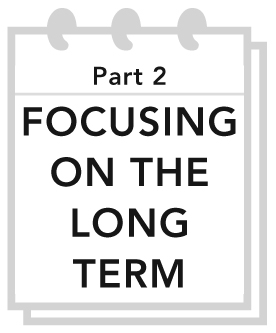
Congratulations! You have practiced a lot of skills and tried out new strategies in the last 16 weeks. Good for you! Certainly some weeks were harder than others, and some skills have been harder to master than others. These skills will carry you far in your quest for a healthy, fun-filled life. So keep at it, consistency is key.
To keep you focused long term, this book’s plan spans a full year. Here we switch to a month-by-month schedule and introduce additional skills you’ll need to make your plan work for the long haul. In these next chapters, we’ll talk about reducing sodium, shopping on a budget, and more.

This month we expand on last week’s goal of fine-tuning your food choices. We reinforce eating a variety of foods to keep you healthy and to make your diet program livable for the long term. Stress management skills are also necessary for your ongoing success, so we take a look at those, too.
For the Long Haul: Stay Out of a Food Rut
The same breakfast day after day followed by the same lunch gets tiresome. Even if you prefer it that way because it’s easy, fast, and comfortable, it breaks the first rule of good nutrition: Eat a variety of foods. No single food provides all the nutrients you need for good health. In fact, it takes a shopping cart of different foods to even come close. Vitamins, minerals, protein, fiber, and antioxidants are just the tip of the iceberg.
Scientists have discovered thousands of phytochemicals, compounds in plants that help prevent disease, and they discover new, important phytochemicals all the time. “Phytochemical” literally means “plant chemical.” The term describes the compounds in fruits, vegetables, nuts, beans, and grains that give the plant color, aroma, and flavor and protect the plant from microbial infestation and other diseases. In the diet, phytochemicals work together and with other nutrients to fend off heart disease, age-related eye disease, cancer, and more. Among their many functions, phytochemicals might prevent DNA damage, boost the immune system, and help relax blood vessels. The only way to get enough of these health-boosting phytochemicals is to eat a variety of plant foods.
Break out of a food rut by starting a supper club among friends, picking a new food each week at the supermarket, shopping in an ethnic market or buying an ethnic cookbook, taking a cooking class, eating fruits and vegetables from each color palette every day, and randomly opening a healthy cookbook to find your next new recipe.
Life is stressful, and having diabetes makes it even more stressful. For some, emotional stress may produce hormones that send blood glucose surging or increase food cravings. The best stress beater is preventing it in the first place, though that is much easier said than done. Stress prevention basics include the following:
• Get plenty of sleep
• Engage in regular exercise
• Eat healthfully
• Enjoy “me time” every day
• Spend time with family and friends
• Confide in someone
• Set realistic goals
• Ask for help when you’re busier than usual
• Do something that makes you chuckle: see a funny movie, read the comics, watch the little kids down the street play
 Continue the following goals: _____________________________________________________________
Continue the following goals: _____________________________________________________________